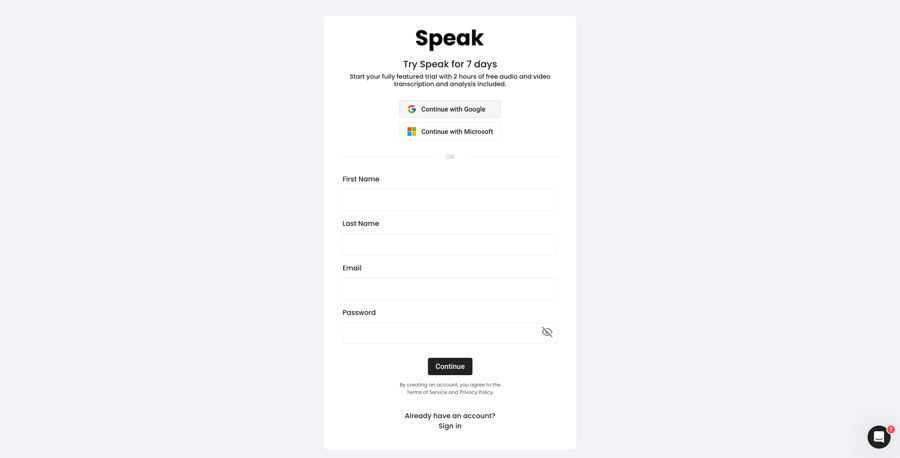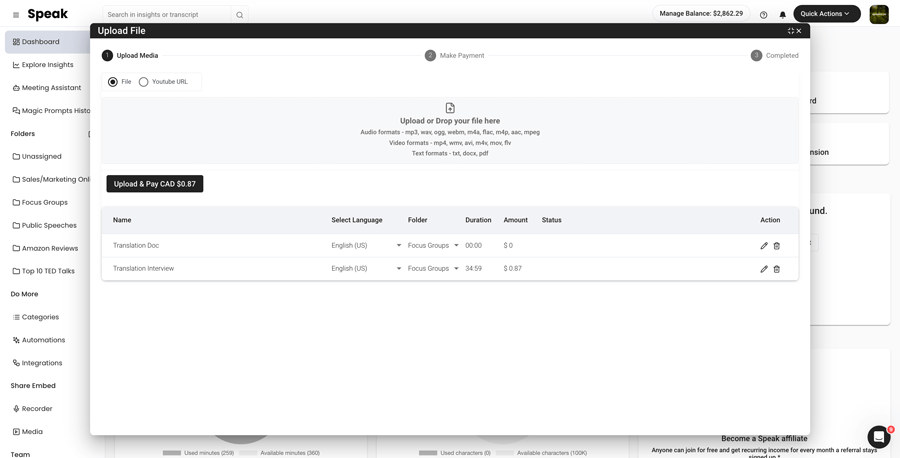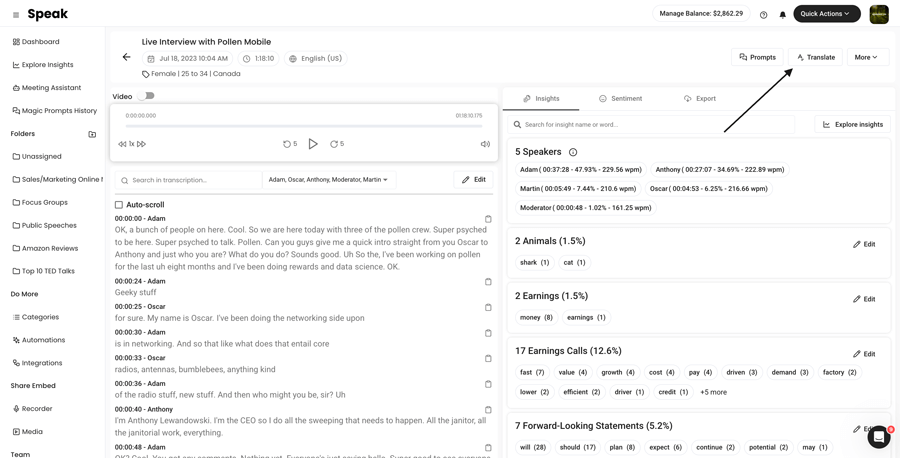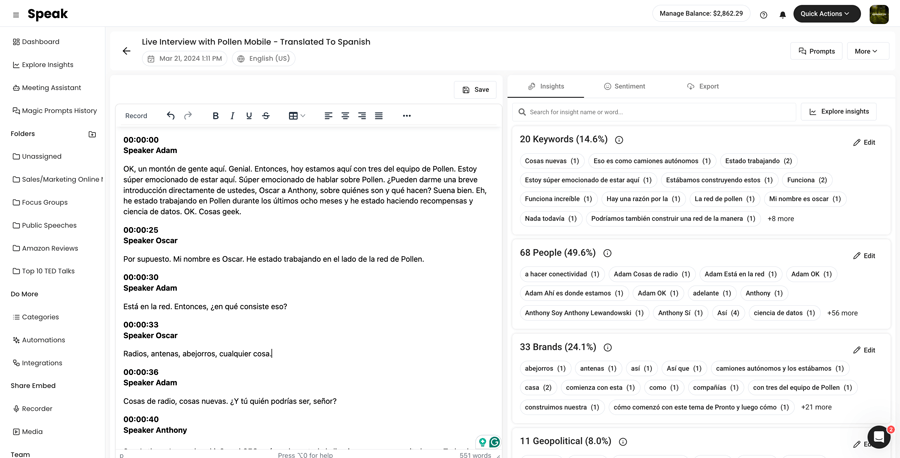How To Translate German to Russian
Translating German to Russian is super simple!

Step 1: Register for Speak
Register for Speak using this link.
Once you register, you can instantly begin translating your German to Russian file(s).

Step 2: Upload Your German file(s)
As soon as you log in, you will be redirected to the dashboard.
Once there, you can select the Quick Action "New Upload".
In Speak, you can seamlessly upload, transcribe and translate audio, video and text files all at once!

Step 3: Translate Your German file(s) to Russian
Once the file is uploaded, simply visit your file and select "Translate".
If it is an audio and video file, Speak will ask you if you want to keep the speaker names and timestamps in the translation.
Want to translate many files at once? No problem!
You can view the files you want to automatically translate from German to Russian from the folder level and instantly translate as many files as you need with our artificial intelligence translation in just a few clicks.

Step 4: That's It! View, Analyze, Modify & Export Your New Russian file(s)
Once the translation is done, you will be alerted and you will see a new document in the same folder your original file is in.
The file will be named the same but with a dash indicating that it is the translated version.
Need support with your German translation?
We are always here and happy to help at Speak!
Just send us a message on live chat on the bottom right corner and we will ensure you are set up for success.
Interested in translating German or other languages to different languages? View our entire list of supported translation languages here.
Automatic, accurate, instant AI translation from German to Russian is here for you.
Register for Speak using this link and begin translating German to Russian today.
Unlocking Multilingual Potential: Translate German to Russian Effortlessly
Language barriers can significantly hinder communication between different cultures, particularly in today's globalized world where businesses and researchers aim to expand beyond local boundaries. Understanding this challenge, Speak AI is dedicated to breaking down these barriers through advanced AI translation technology. When it comes to bridging communications between German and Russian speakers, our tools offer seamless, accurate, and efficient solutions.
The Significance of German-Russian Translation in Today’s World
Translating between German and Russian is not just about converting words; it’s about fostering understanding and connections. Germany and Russia have strong economic ties, with numerous businesses operating in both countries. Moreover, the research and academic collaboration between these nations demand clear and accurate communication. Our translation technology caters to these needs, ensuring that language no longer poses a limitation.
For Businesses and Researchers: A World of Convenience
Using Speak AI's cutting-edge technology, businesses can localize their content, services, and products for new markets, while researchers can share their findings and collaborate more effectively. The translation isn't just textual; our AI Meeting Assistant can transcribe and translate discussions from meetings held over platforms like Microsoft Teams, Zoom, Google Meet, and Webex, making every word count.
Comprehensive Solutions for German to Russian Translation
Speak AI doesn’t just translate; it transforms how we communicate across language barriers. Our tools integrate NLP, large language models, data visualization, and Generative AI for unparalleled accuracy and efficiency.
Benefits: Unleashing the Power of AI Translation
- Save Time and Resources: Automatically translating audio, video, and text eliminates the need for manual translation, significantly reducing costs and time.
- Enhance Accuracy: With continuous learning algorithms, our AI systems understand context, tonality, and subtleties in both German and Russian, ensuring precise translations.
- Expand Reach: By translating content into Russian, German businesses and researchers can tap into the vast Russian-speaking market and vice versa, fostering international growth and collaboration.
Use Cases: Where Translation Meets Innovation
- Business Expansion: Localize marketing material, websites, and product documentation to engage a Russian-speaking audience effectively.
- Academic Collaboration: Share research papers and academic works with Russian counterparts seamlessly, broadening scholarly communication.
- Media Consumption: Translate German documentaries, films, and educational content into Russian, making it accessible to a wider audience.
Understanding the Dynamics: German and Russian on the Global Stage
Where Are German and Russian Popular?
German and Russian are among the most spoken languages in Europe, with significant communities around the world. German is primarily spoken in Germany, Austria, Switzerland, and parts of Belgium and Luxembourg. On the other hand, Russian is not only the official language of Russia but also widely spoken in former Soviet states like Ukraine, Kazakhstan, and Belarus.
Interesting Stats and Historical Insights
Germany and Russia have rich, intertwined histories that date back centuries. Today, Germany is the EU's largest economy, and Russia is a significant global player, with both countries having a combined population of over 200 million people. Their languages reflect their storied pasts, with numerous loanwords and cultural exchanges influencing both lexicons.
Fascinating Aspects of German and Russian Languages
Fun Facts That Bridge Cultures
Did you know that the Russian language doesn’t have articles like ‘the’ or ‘a’? Or that German has a reputation for lengthy compound words, which can sometimes express complex ideas or emotions in a single word? These linguistic quirks add depth and character to each language, making translation an exciting challenge.
Differences and Similarities: A Linguistic Tapestry
While German and Russian belong to different language families—Germanic and Slavic, respectively—they share several features, such as cases and gender nouns. However, their syntax, phonology, and alphabets differ significantly, showcasing the diversity and richness of human languages. Through AI translation, Speak AI champions understanding and appreciating this linguistic diversity, making it accessible to all.
Speak AI: Your Gateway to Seamless German-Russian Communication
Speak AI is committed to harnessing the power of AI to bridge language gaps, enhancing connectivity, and driving global collaboration. With a 4.9 rating on G2 and over 150K users, our technology stands at the forefront of automatic translation. Whether you are a business seeking to tap into new markets or a researcher aiming for broader dissemination of your work, Speak AI empowers your German to Russian translations with accuracy, efficiency, and flair.
In a world where language barriers can limit potential, Speak AI equips you with the tools to transcend these boundaries, opening doors to limitless possibilities. Join us on this journey of discovery and innovation, where every word gets the attention it deserves, and no message is lost in translation.
---
SEO-Optimized Questions & Answers
What locations are German and Russian popular?
German is predominantly spoken in Central Europe, especially in Germany, Austria, Switzerland, and parts of Belgium and Luxembourg. Russian, being the most widely spoken Slavic language, is prevalent in Russia and has considerable speakers in countries like Ukraine, Kazakhstan, and Belarus.
What are some fun facts about German and Russian?
German is known for its compound words that can express elaborate ideas or emotions. Russian, intriguingly, does not use articles, creating a distinct language structure compared to German.
What are the differences and similarities between German and Russian?
While stemming from different linguistic families—German from the Germanic family and Russian from the Slavic—they share grammatical features like cases and gendered nouns. However, their phonetic systems, syntax, and writing scripts showcase the diversity and richness of human language.
Translate German To These Other Supported Languages:
- Translate German-to-Arabic (Egypt)
- Translate German-to-Arabic (Iraq)
- Translate German-to-Arabic (Israel)
- Translate German-to-Arabic (Jordan)
- Translate German-to-Arabic (Kuwait)
- Translate German-to-Arabic (Lebanon)
- Translate German-to-Arabic (Oman)
- Translate German-to-Arabic (Palestinian Authority)
- Translate German-to-Arabic (Qatar)
- Translate German-to-Arabic (Saudi Arabia)
- Translate German-to-Arabic (Syrian Arab Republic)
- Translate German-to-Arabic (United Arab Emirates)
- Translate German-to-Arabic Modern Standard (Bahrain)
- Translate German-to-Armenian
- Translate German-to-Bulgarian
- Translate German-to-Catalan
- Translate German-to-Chinese (Cantonese, Traditional)
- Translate German-to-Chinese (Simplified)
- Translate German-to-Chinese (Traditional)
- Translate German-to-Croatian
- Translate German-to-Czech
- Translate German-to-Danish
- Translate German-to-Dutch
- Translate German-to-English
- Translate German-to-English (Australia)
- Translate German-to-English (India)
- Translate German-to-English (Ireland)
- Translate German-to-English (New Zealand)
- Translate German-to-English (Scottish)
- Translate German-to-English (South African)
- Translate German-to-English (United Kingdom)
- Translate German-to-English (United States)
- Translate German-to-Estonian
- Translate German-to-Farsi
- Translate German-to-Finnish
- Translate German-to-French
- Translate German-to-French (Canada)
- Translate German-to-German
- Translate German-to-German (Swiss)
- Translate German-to-Greek
- Translate German-to-Gujarati
- Translate German-to-Hebrew
- Translate German-to-Hindi
- Translate German-to-Hungarian
- Translate German-to-Icelandic
- Translate German-to-Indonesian
- Translate German-to-Irish
- Translate German-to-Italian
- Translate German-to-Japanese
- Translate German-to-Kannada
- Translate German-to-Korean
- Translate German-to-Latvian
- Translate German-to-Lithuanian
- Translate German-to-Malay
- Translate German-to-Malayalam
- Translate German-to-Norwegian
- Translate German-to-Persian
- Translate German-to-Polish
- Translate German-to-Portuguese
- Translate German-to-Portuguese (Brazilian)
- Translate German-to-Portuguese (Portugal)
- Translate German-to-Romanian
- Translate German-to-Russian
- Translate German-to-Slovak
- Translate German-to-Slovenian
- Translate German-to-Spanish
- Translate German-to-Spanish (Mexico)
- Translate German-to-Swedish
- Translate German-to-Tamil
- Translate German-to-Telugu
- Translate German-to-Thai
- Translate German-to-Turkish
- Translate German-to-Ukrainian
- Translate German-to-Vietnamese



